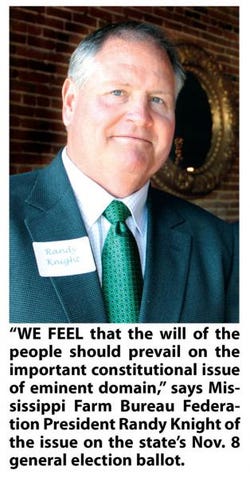
Mississippi vote upcoming on eminent domain reform
Mississippi voters will have an opportunity in the Nov. 8 general election to express their opinion on whether the state should be restricted in its ability to take private property through eminent domain. Mississippi was one of only a handful of states in the nation without such safeguards following a landmark U.S. Supreme Court ruling that opened the way for private property to be taken under eminent domain for private development.

After a concentrated statewide petition-signing campaign, followed by a legal challenge that went all the way to the state supreme court, Mississippi voters will have an opportunity in the Nov. 8 general election to express their opinion on whether the state should be restricted in its ability to take private property through eminent domain.
Mississippi was one of only a handful of states in the nation without such safeguards following a landmark U.S. Supreme Court ruling that opened the way for private property to be taken under eminent domain for private development.
The petition effort, spearheaded by the Mississippi Farm Bureau Federation, resulted in almost 120,000 signatures asking that the issue be included on the ballot. Only about 90,000 were needed to comply with voting regulations.
Hardly had the secretary of state verified that the number of petitions was adequate before the director of the Mississippi Development Authority, acting as a private citizen, filed a legal challenge, contending that the measure would hamper economic development in the state. The argument ended up before the Mississippi Supreme Court, which ruled in early September that it could be placed on the ballot.
“We were very pleased with the court’s decision,” says Randy Knight, president of the 190,000-member state Farm Bureau organization. “It has been important to us, in leading this effort, that the average citizen not be run over by our own government.
“They have to have a way to protect family land and homes, and not be put to the considerable expense of defending an eminent domain case. We urge Mississippians to go to the polls Nov. 8 and vote ‘yes’ on Initiative 31 to prevent eminent domain abuse.”
The Farm Bureau organization had made several attempts in recent years to get an eminent domain bill into law. But although it passed the House and Senate in 2009, Governor Haley Barbour vetoed it, which spurred the farm group to start the petition drive to put the measure on a statewide ballot.
Forty-plus states enacted laws to strengthen private property rights following the U.S. Supreme Court’s 2005 5-to-4 landmark ruling (Kelo vs. City of New London, Conn.) that held if a private company or individual can make better use of a piece of property than the current owner, it is legal for the government to use eminent domain to force the owner to sell his property to the developer.
In the New London case, the court ruled that held that 15 homes in a waterfront neighborhood could be acquired by the city, turned over to private developers, and ultimately replaced by a luxury hotel, upscale condos and office buildings. The city justified the project as a way to generate tax revenue and jobs.One of the landowners, Suzette Kelo, filed a lawsuit alleging that the city’s actions were unconstitutional since economic development was not a ‘public use.’
The Supreme Court ruling said that economic development was a public use since the increased tax revenue would benefit the public.
In a stinging dissent to the majority ruling, Justice Sandra Day O’Connor wrote: “The specter of condemnation hangs over all property. Nothing is to prevent the state from replacing any Motel 6 with a Ritz-Carlton, any home with a shopping mall, or any farm with a factory. The beneficiaries are likely to be those citizens with disproportionate influence and power in the political process, including large corporations and development firms.”
'A whole new can of worms'
The court’s ruling “opened up a whole new can of worms,” says Farm Bureau’s Randy Knight. “Historically, eminent domain has been defined as the government’s right to take land, through fair compensation, for public use. But this ruling now gives government the right to also take private property for private development. We feel that the will of the people should prevail on this important constitutional issue.”
Otherwise, Knight says, “Government can take your land and transfer it to Walmart, Kroger, or a developer wanting to build a shopping center, because that would generate more tax revenue than the current owner.”
Eminent domain became a highly visible issue in Mississippi in 2001, when the state initiated condemnation proceedings against Canton, Miss., property owners to clear 24 acres of their land for a giant Nissan vehicle manufacturing plant that would require some 1,400 acres. The matter ended up before the Mississippi Supreme Court and was later resolved by Nissan redesigning its facility so the family could hold onto its land and homes.
“Initiative 31 will strengthen the rights of Mississippi property owners and greatly reduce the chances that eminent domain will be used to take land for economic development purposes,” Knight says. “It will force any government entity that takes land for economic development to hold that land for 10 years before turning it over to the developer.”
He points out that the initiative would not affect the traditional uses of eminent domain.
“Governments can still use eminent domain to acquire property for bridges, roads, utilities, schools, etc. Initiative 31 does not change the bill of rights in the Mississippi constitution.”
Leland Speed, director of the Mississippi Development Authority, who as a private citizen filed the legal challenge against the initiative, contends that the state “does not have a history of abuse of property rights or eminent domain for economic development.”
He said if the measure passes it would take away power from the courts to determine what constitutes public use for economic development, and that it would prevent the legislature, governor, and local officials from getting together to pursue economic development for the state.
Farm Bureau counters that such language hasn’t stopped economic development in 43 other states.
“Most large companies don’t use eminent domain and wouldn’t take it into consideration,” says Knight. “Economic development starts with a willing buyer and a willing seller. Studies of economic trends following the Kelo decision have determined that there appears to be no negative economic consequences from eminent domain reform — that state trends in all three economic indicators were essentially the same after reform as before.”
The reform measure will not be of benefit only to farmers, Knight says.
“It’s for all Mississippi citizens, who are entitled to be secure in their home or on their land, against the threat of it being taken for what really is private use by someone with more assets than they have.”
About the Author(s)
You May Also Like



